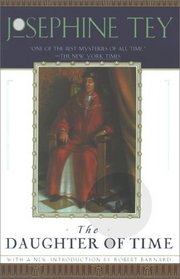Helpful Score: 6
Tey focuses on the legend of Richard III, the evil hunchback of British history accused of murdering his young nephews. While at a London hospital recuperating from a fall, Inspector Alan Grant becomes fascinated by a portrait of King Richard. A student of human faces, Grant cannot believe that the man in the picture would kill his own nephews. With an American researcher's help, Grant delves into his country's history to discover just what kind of man Richard Plantagenet was and who really killed the little princes.
Helpful Score: 5
Loved this interesting take on Richard III's life and legacy. It's a modern-day detective that looks back on the mystery of Richard's life and what may have happened to tarnish his reputation.
Quick read.
Quick read.
Helpful Score: 4
Detective tale about a Miss Marple-ish character who, housebound while nursing an injury, sets out to find out if Richard III is really the "wicked uncle" that history has painted - and exactly who murdered the Princes in the Tower. A great read!
Helpful Score: 4
This book was one of the best I have ever read. Although it is fiction, it delves into an ancient mystery and uses history. I often wondered how a man like King Richard III changed so suddenly in his beliefs and morals to "murder" his 2 nephews. This book opened my mind to the possibility, and I believe truth, that the murder actually belongs to King Henry VII. Highly recommended!
Helpful Score: 4
This book is an example of what I mean when I tell people history is like a detective story: you don't have all the information, your witnesses might be mistaken or lying (and/or dead), you might not have a body, and you can probably piece together several plausible explanations of whodunnit.
In this book, a Scotland Yard detective who's stuck in the hospital starts investigating Richard III, and discovers that the one-sentence accounts his old schoolbooks gave (basically, "Richard was bad and killed his brother and the princes") are covering up a much more complicated story of missing information, bias, and propaganda. A lot of textbook-style history is like this, which is a shame, because it's so much more interesting when you don't try to force it into a simplistic, pre-determined story with no room for doubt or alternate interpretations!
For anyone who wants to know more about the history and debates over Richard III, you can check out the non-fiction account in "Royal Blood: Richard III and the Mystery of the Princes" by Bertram Fields.
In this book, a Scotland Yard detective who's stuck in the hospital starts investigating Richard III, and discovers that the one-sentence accounts his old schoolbooks gave (basically, "Richard was bad and killed his brother and the princes") are covering up a much more complicated story of missing information, bias, and propaganda. A lot of textbook-style history is like this, which is a shame, because it's so much more interesting when you don't try to force it into a simplistic, pre-determined story with no room for doubt or alternate interpretations!
For anyone who wants to know more about the history and debates over Richard III, you can check out the non-fiction account in "Royal Blood: Richard III and the Mystery of the Princes" by Bertram Fields.




